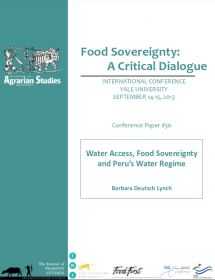Ideas into movement
Boost TNI's work
50 years. Hundreds of social struggles. Countless ideas turned into movement.
Support us as we celebrate our 50th anniversary in 2024.

Peru’s water regime is the product of 20 years of negotiations involving the state and non-state actors, the World Bank and the InterAmerican Development Bank. The 2009 water law and the institutions which have been designed to implement it are informed by IWRM discourse.

Peru’s water regime is the product of 20 years of negotiations involving the state and non-state actors, the World Bank and the InterAmerican Development Bank. The 2009 water law and the institutions which have been designed to implement it are informed by IWRM discourse. While on the surface, it appears to be a rejection of the neoliberal water privatization project, its principal beneficiaries are the agro-export and energy sectors. Using case materials from the conflictive Rio Santa and Rio Ica watersheds, this paper asks what the new water regime means for food sovereignty, in particular for the power of highland campesinos, small- to mid-scale coastal farmers, and artisanal fishers to supply domestic markets.
Visiting Associate Professor of International Affairs and City and Regional Planning, Georgia Institute of Technology. A development sociologist, Professor Lynch’s current research treats watershed governance and conflict in Peru. In 2012 she was Alberto Flores Galindo Visiting Professor, Pontifical Catholic University in Lima. Lynch has written on Latino environmentalisms and agriculture and environment in the Hispanic Caribbean. She edited with Sherrie Baver, Beyond Sand and Sun: Caribbean Environmentalisms.
Food Sovereignty: a critical dialogue, 14 - 15 September, New Haven.